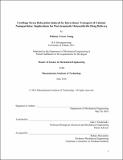| dc.contributor.advisor | Alan J. Grodzinsky. | en_US |
| dc.contributor.author | Young, Whitney Terese | en_US |
| dc.contributor.other | Massachusetts Institute of Technology. Department of Mechanical Engineering. | en_US |
| dc.date.accessioned | 2016-09-13T18:08:58Z | |
| dc.date.available | 2016-09-13T18:08:58Z | |
| dc.date.copyright | 2016 | en_US |
| dc.date.issued | 2016 | en_US |
| dc.identifier.uri | http://hdl.handle.net/1721.1/104138 | |
| dc.description | Thesis: S.M., Massachusetts Institute of Technology, Department of Mechanical Engineering, 2016. | en_US |
| dc.description | This electronic version was submitted by the student author. The certified thesis is available in the Institute Archives and Special Collections. | en_US |
| dc.description | Cataloged from student-submitted PDF version of thesis. | en_US |
| dc.description | Includes bibliographical references (pages 65-72). | en_US |
| dc.description.abstract | Avidin has previously been proposed as a drug carrier molecule for intra-articular injection of osteoarthritis (OA) therapeutics. Its nanoscale size and net positive charge make it a viable candidate for transport into and through articular cartilage, one of the most affected tissues in OA. Avidin has been shown to have a high uptake into and long retention time within cartilage, and is also non-toxic to chondrocytes. The goal of this thesis was to assess whether avidin has any deleterious effects on the mechanical properties of cartilage as it moves into and through the tissue. Using cartilage explants in vitro, mechanical stress relaxation experiments were performed at two ionic strengths (low = 0.015 M NaCl and physiologic = 0.15 M NaCl) in the presence and absence of added avidin. After an initial set of compressive strain ramps and relaxations, 100 [mu]M avidin was added to the test chamber to determine whether additional changes in the stress relaxation behavior occurred. The stress was monitored for 18 hours after the addition of avidin. In addition, real-time one-dimensional transport experiments were performed to estimate the diffusivity of avidin within cartilage. Experiments were conducted using both immature (2 - 3 weeks old) bovine and adult (26 - 62 years old) human cartilage. Avidin was found to have effects on the mechanical properties of cartilage in certain environmental conditions. At the lower ionic strength, avidin caused both the bovine and human cartilage to relax to a lower final equilibrium stress. Addition of avidin to bovine cartilage disks in physiologic ionic strength caused a faster stress relaxation and an increased tissue Young's modulus. However, in the most clinically relevant condition tested--adult human cartilage in physiologic ionic strength--no differences were observed in the mechanical properties when avidin was added. Diffusive transport times for avidin through cartilage were found to be ~4- fold faster in immature bovine cartilage compared to adult human cartilage. The results of these studies suggest that avidin does not adversely affect the mechanical strength of cartilage in clinically relevant conditions, a critical requirement of any drug delivery vehicle to cartilage. Although this study focused on avidin as a potential drug-carrying nanoparticle, the protocols and analysis methods developed can be used to study other candidate drug carriers in the future. | en_US |
| dc.description.statementofresponsibility | by Whitney Terese Young. | en_US |
| dc.format.extent | 100 pages | en_US |
| dc.language.iso | eng | en_US |
| dc.publisher | Massachusetts Institute of Technology | en_US |
| dc.rights | M.I.T. theses are protected by copyright. They may be viewed from this source for any purpose, but reproduction or distribution in any format is prohibited without written permission. See provided URL for inquiries about permission. | en_US |
| dc.rights.uri | http://dspace.mit.edu/handle/1721.1/7582 | en_US |
| dc.subject | Mechanical Engineering. | en_US |
| dc.title | Cartilage stress relaxation induced by intra-tissue transport of cationic nanoparticles : implications for post-traumatic osteoarthritis drug delivery | en_US |
| dc.title.alternative | Implications for post-traumatic osteoarthritis drug delivery | en_US |
| dc.type | Thesis | en_US |
| dc.description.degree | S.M. | en_US |
| dc.contributor.department | Massachusetts Institute of Technology. Department of Mechanical Engineering | |
| dc.identifier.oclc | 958162729 | en_US |
